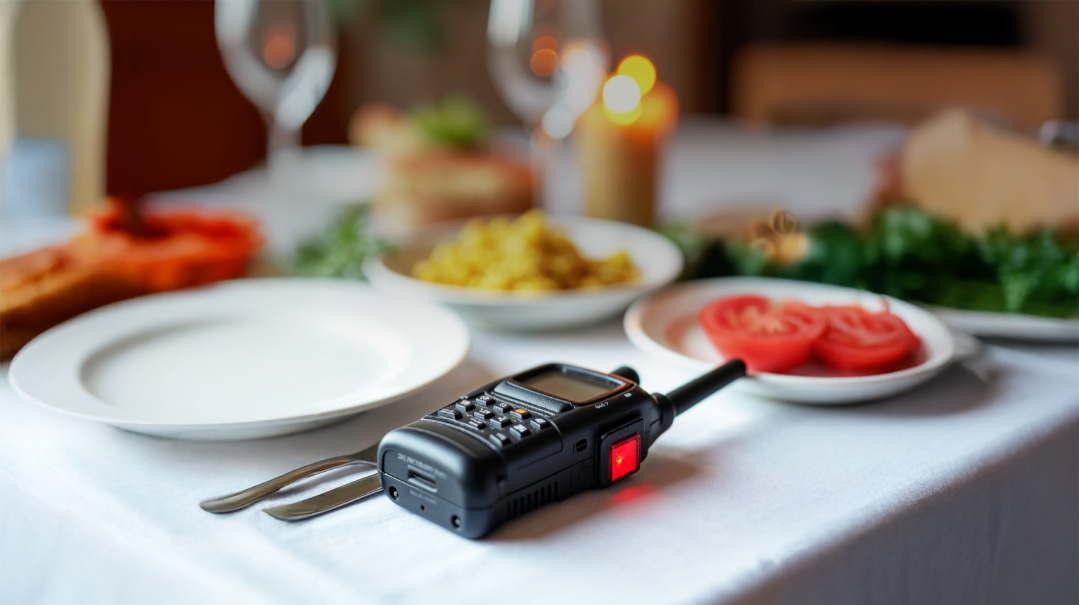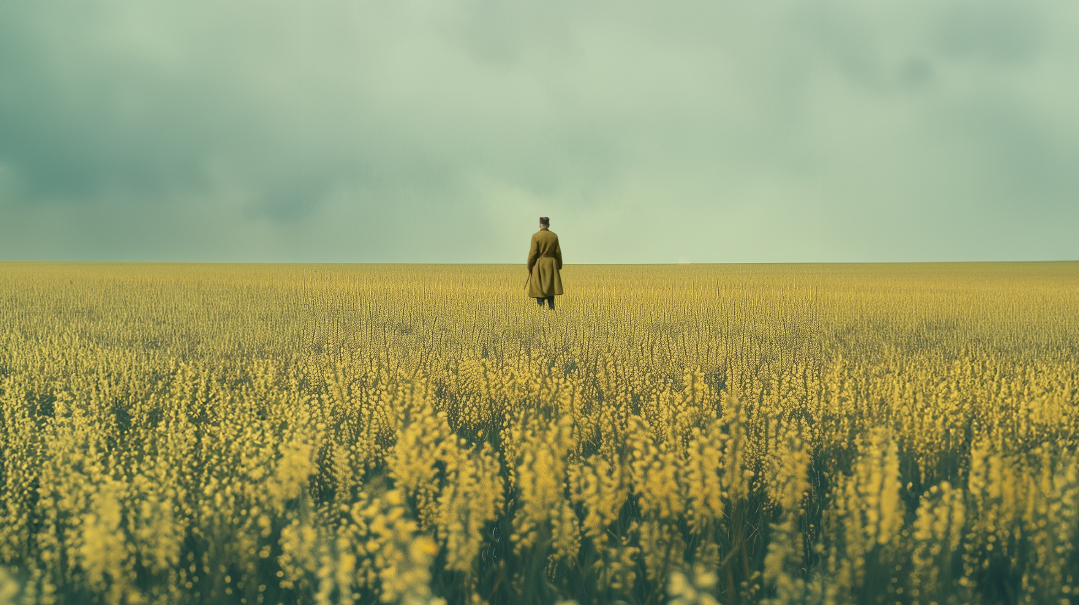By Design

“She really has to come live here. She should be near us. What else does she need at this point besides us and our children, her nachas?”

“She’s not answering.”
The phone is clammy in Gila’s palm. “I’ve been trying Mom all evening. Seriously, Avigail, whose phone is off at three in the afternoon?”
From her window, Gila takes in the inky blackness of the Jerusalem night. They’re half a day and half a world away from Mom who’s on her own, somewhere in a New York afternoon.
“I’m calling Dora from my cellphone,” Avigail says. “Hold on.”
Gila waits on the line, feeling the darkness, the distance, press in on her; all those lines of latitude away. She closes the curtain in one nervous swipe.
She hears a tinny voice come over the loudspeaker, and Avigail say, “Hi Dora, it’s Abigail, calling from Israel. Have you seen my mother today? My sister and I have been trying her.…”
“Abigail, dear. I saw your mother this morning, getting into her car. She was looking spiffy, dressed to go out. Don’t worry yourselves. She’s probably having a good time and forgot to charge her phone. That can happen with us old folks….”
Gila hears Avigail try for a laugh. “Thanks, you’re the best, Dora.”
But neither of them is really placated.
“Dressed to go out,” Avigail says. “Where would she be going?”
“Her volunteer work, you know...” Gila tries.
“She just needs to come here,” Avigail says.
Not again. But Avigail’s bulldozing on. “You know what, I think that’s it. I think it’s time to look for an apartment for Mom right here in Yerushalayim. Once we find her a place, there’ll be nothing else holding her back from this move she really has to make.”
That’s not quite true, Gila knows. She thinks of the new condo Mom downsized to recently. She has a whole life in that new building of hers in Brooklyn Heights. Her friend Dora, a gym and a pool, her clique of pool ladies, her volunteer work.
“I’m going to start looking into apartments,” Avigail says decisively.
Gila doesn’t try to naysay her sister right now. She’s concerned too. Her kitchen shows it. There’s a half-started fish dressing, and the vegetables she’d taken out for the soup sitting prettily on the counter. She was going to put up that soup while catching up with Mom….
She sighs.
“Hey, where you up to with Shabbos?” Avigail asks.
“Not much. Unpeeled vegetables all around.”
“Come to us for the Friday night meal,” says Avigail.
And Gila falls into the familiar script.
*
On Friday night, Gila and the kids walk over to Avigail’s apartment in the balmy air, taking the stone-step shortcut that makes their homes ten minutes apart.
When they get there, Avigail’s girls settle onto the floor with Gila’s Levi and Sara.
“Where’s Moshe?” Levi asks Avigail. At five, he adores his older cousin.
“In shul,” Avigail says, like it’s the most obvious thing. “Here, sweeties.” She takes out the magna-tiles and menschies.
Levi starts on a colorful structure which he decides is a police station. Gila sits near him, leaning against the sofa, looking up at her sister.
“I finally spoke to Mom right before Shabbos,” she says. “She said something was up with her phone, but she sounded chipper. Makes me feel better.”
“I don’t know… it’s not like it’s a one-time concern.” Avigail smooths the suede of the round couch cushion. “She really has to come live here. She should be near us. What else does she need at this point besides us and our children, her nachas? And anyway, every Yid should be living here.”
She rises off the couch, dropping the round cushion like the point of an exclamation mark on her vocal statements, and gets busy setting the table.
Gila stays on the floor, handing colorful tiles to Mom’s nachas. Her eyes flutter closed. Avigail’s conviction stirs a memory. Last year she’d gone to help Mom with her move from the big house to her new condo, and they’d sorted through every last thing.
In her mind’s eye she sees herself standing in her parents’ room, sees Dad’s closet, Mom glancing sidelong at it. It was empty. Utterly bare. Six years earlier, when Dad died, she and Avigail had gone through a similar rigamarole of sorting and discarding, and they hadn’t left a thing.
As dust motes caught in the harsh beam of sunlight between them, Mom, face resigned, had gestured at the empty shelves and said, “It’s because I wasn’t really there, I wasn’t me… I just didn’t have the presence of mind to say anything while Abigail and you were carting out his stuff. You meant well… but you didn’t know that every night of the shivah I came up here and breathed in his woolen suits; the lapels had this faint cigar smell, and it was so — him.” Then she sighed. “Remember how he used to sit outside on the porch puffing on a cigar in that focused way of his?”
“Oh…” Gila had said, voice small. They had been very efficient. Brutally efficient? “You didn’t say anything.”
“No, because it was stupid. Smells fade, and maybe it had already faded by then, maybe it was just my imagination all along…. You were trying to help me. And Abigail had the clothing donated. And you had to be practical.”
“We felt pressured,” Gila said, voice hoarse and apologetic. “We had to go back to our families. There was so little time….”
Now Gila wishes — as she did then — that they hadn’t been so headlong, so eminently efficient. They could have left Mom a necktie to hold on to, to breathe in.
She hands Levi another magna tile. Wishes, wishes… If she’s wishing already, it’s that they’d live near Mom, and that her little ones could visit their grandmother as casually as they visit Avigail.
The men show up, the meal begins. Gila sits between her husband and her sister, enjoying the familiarity of their two young families interacting. There’s some squabbling among the cousins, Shlomo’s mediation jokes that they’ve all heard before, good food.
Binyamin clears his throat and starts a vort on the parshah, and Avigail goes attentive.
Gila’s too tired to try to follow. She looks around: at her sister who’s never too tired for a vort; at her Levi, who’s heartily enjoying his portion; then down at her own plate, with its chicken roasted just so and potato kugel, perfectly light-yellow inside. As if Avigail had grown up on some Bubby’s perfect kugel and was continuing a tradition. As if she had a golden chain anchoring her to Hungary or Poland, instead of all-American parents who’d found their way to Yiddishkeit in their late 30s.
Binyamin finishes up and Avigail smiles. She adds something of her own, then taps Gila. “Remember in seminary, Rebbetzin Reisman said this?”
Rebbetzin Reisman is a legend, unforgettable, but what Gila remembers is a feeling, not a particular insight on the parshah.
She had attended the same seminary as Avigail. But it was Avigail who’d paved the way, making the sharp turn from their more modern high school to a mainstream yeshivish seminary in Israel. She’d dropped the Abigail, embraced the frum pronunciation, and remade herself into a “natural.”
While Avigail had to push and pull to get accepted to seminary, when it was Gila’s turn two years later, the name Fellerman meant something. Sure, it was hard to fight the tide of all her friends who were going straight to college, but Avigail had always been her icon. I’m a lamb, she thinks suddenly.
When they leave, Sara is cranky and Shlomo pulls out her blankie and a Peter Rabbit board book from the stroller bag.
“I brought it back from Mom’s house when we were there for Pesach. Sara loves it already,” Gila tells Avigail. “There’s a whole stack, Beatrix Potter’s World of Peter Rabbit, you’re welcome to have some for your kids. Why not give them something from our childhood?”
“Thanks, but I’m good,” Avigail says, smiling a bit tightly, indicating the floor, where Malky from Is it Shabbos? and three different Dina Dees grin pointedly at Gila from some book covers.
*
“This needs something else, some other significant detail,” Gila tells her boss, Yaeli, as she looks over some sketches that Yaeli’s designing on the computer. “What about some embroidery on the waistline?”
“Hmm,” Yaeli says, biting on cherry-red lips.
She won’t take an idea just like that — she’s Israeli and type A all the way — but Gila knows how much her suggestions are valued. Her creativity shows in so many of the little touches in this season’s couture collection out on the shop floor — and in the other branches. Over time, Yaeli’s turned her from a saleswoman into fellow designer. She still works on the floor, but it’s in the back room with Yaeli that she comes alive; the burning brush of creativity.
She gets on with the day’s tasks — dressing some of the mannequins — while Ronit, another employee, deals with a customer.
“No, that’s too different. I’m looking for something classic. Quieter,” the woman says.
She sounds like Avigail.
Gila adjusts the blouse on the mannequin.
On their way home from Avigail’s house on Shabbos, Shlomo had laughed about the Peter Rabbit thing. “As if Flopsy, Mopsy, and Cottontail are going to derail her children from the path, show them other burrows.”
She’d laughed at that, but said, “You know it’s not that.”
“I know,” he’d said, “but c’mon, Gila, you have to stop letting her get to you.”
For him it’s something he can joke about. Who cares what your sister thinks, live your own life.
For her? Avigail looms large.
It’s not only the kids’ books, it’s so many other, unspoken things. This very job, for Heaven’s sake.
From the start, Avigail had been critical about her unexpected progression to designer. Nothing outright, but Gila could read cues as well as the next person. It’s materialistic. To spend all day thinking about trends and styles…?
She appraises the mannequin, tugs and straightens the skirt until it’s just right. Is it only Avigail? Is there a part of me that judges myself for this job, too?
She’s happy.
She wouldn’t trade her life for anything. But when it comes to Avigail there’s an underlay of guilt, because in a hundred subtle ways, she’s living it differently than the sister who paved the path for her.
“Gila,” Yaeli calls from the back, “do you have a minute?”
She throws a sympathetic smile to Ronit; the customer is still driving her crazy.
In the back office, Yaeli indicates the screen. “Apparel Sourcing Paris, Expo at Porte de Versailles, Paris.”
“This major fashion trade show is coming up in a few weeks,” she says. “Do you think you could make these dates work?” Wide cherry smile. “I’d like to take you along to Paris.”
Staring at Yaeli’s screen, Gila can’t help the grin blooming on her face. I didn’t mean to become a fashion designer, she tells Avigail in her head. Honestly, I planned to stay on the typical frum-girl track — like you. Not to fly to Paris to source couture.
But G-d has a way of taking you out of the woodwork, even when you’re trying to blend in like your life depends on it. This work; it’s what I’m meant to be doing.
“Yes!” She tells Yaeli.
*
In the tiny window of sanity between work and the kid’s gan pickup, Avigail calls. “The realtor’s supposed to show us the apartment at three thirty, you coming?”
“The apartment. Sure.”
As Gila walks, she squints against the bright sun, feels anticipation, pride. Yaeli. Paris.
Avigail’s on the next corner, waiting. Gila arranges her face, swallows the excitement. She’s not telling Avigail right now. The last thing she needs is a mussar shmuess about the schmutz at a fashion expo. They find the building and take the elevator up to the first floor, just to try it.
“Good working order,” Avigail says, businesslike.
The agent’s there on the small landing, and he opens the door for them. The main room is nice enough, and it opens to the mirpesset.
“Look at that view — and from a first floor! It’s the way this home is built into the mountain,” the agent says.
“Hmm,” Gila says. There’s some green mountain and soft sky in the view, but it’s mostly obscured by other buildings. “I’d want her to get the afternoon sun and the sunset, I don’t think you can see it from here.”
“Not a dealbreaker,” says Avigail quickly, but she’s not a sun-lounger like Mom.
It’s the bedroom that’s the real issue. So small and utilitarian. The agent hovers near the doorframe. Avigail says nothing, so Gila says it for her. “This wouldn’t work for Mom, she has so many things. She kept practically everything when she downsized.”
Avigail appraises the narrow beds, sits down on one to feel the mattress.
“Do you remember that purple suit?” Gila asks.
“With the matching skirt?”
Gila groans. “She insisted on keeping it.” She indicates the small cupboard. “This is not going to work for Mom with all her stuff. She even kept the entire basket of costume jewelry….”
“The flamingo pin?”
“Of course. And you know what else she wouldn’t let me throw out? That oversized sweater, the green one with the snowflakes and bells….”
“Not that sweater!” Avigail says. “She doesn’t get that it doesn’t pas?”
For a moment she thinks her sister will be upset — Mom not caring about the unwritten rules again — but Avigail starts to laugh and Gila laughs, too, the small room, their post-work tiredness taking their mirth to hysteria.
She notices the agent in the door again, looking at them like they’re missing screws.
They try for composure, then they apologize to the agent, tell him this won’t work, and leave.
“I’m sure there are other options,” Avigail says.
Gila looks at her sister, aflush with determination. Who says we should even be doing this? Just as they reach the corner where they part ways, she chokes out, “I don’t know, Avigail. You really think Mom wants to do this?”
Avigail juts out her chin. “Moving to Eretz Yisrael is a ruchniyus thing,” she says. “With ruchniyus you don’t overthink it, you just do.”
Gila’s head is hurting. Is that so? Is that what she had done when she’d come? Is that really what Mom should do?
*
At night, she calls Mom, half expecting her not to answer because she’s been erratic about responding to calls lately. Does the dial tone sounds different from the usual?
You’re becoming paranoid, she tells herself, when Mom answers on the last ring.
“Hi, Mom, any idea why the dial tone’s strange?”
“Oh, Gila, I’m not sure, but you are calling from the Middle East.”
She laughs. “How’re you doing, Mom?”
“Good, really good. How are the kids?”
Mom sounds chipper, and they meander through the standard small talk: Sara’s antics, Mom’s arugula salad recipe. From outside comes the sudden wail of the levayah announcement car. She closes the window quickly — the kids are sleeping — and says to Mom, “Hey, we didn’t get to talk about Dad’s yahrtzeit somehow, and it’s already next week. Any chance you’ll come here?”
Mom had done that the first couple of years, spent the yahrtzeit with her two girls in Israel. Then during Covid, when air travel got difficult, she stopped coming, paring her trips down to yearly Succos visits.
“Hmm. I thought about it, but no. Dad’s grave is here, after all. And it’s just going to be too much now.”
“But wouldn’t it be good for you to come?”
“It’s always good, but not right now, Gila. I have a life, too….”
Her mom’s retired. Back in the day she’d owned a small café on the avenue. She was great at food prep and styling, and loved to chat with the customers — cozy chic, she used to say wistfully about her café. She ended up selling the place when the girls came along; she’d been a stay-at-home mom for most of their childhood. Through the years, she’d often thought about starting another place, but she didn’t have the nerve or patience or the need really. She hadn’t had to work; Dad was the career man. Now, with Dad gone, she mostly did volunteer work, home-catering for tzedakah events and for cash-strapped families making simchahs.
“Shul functions, tzedakah events keeping you busy?” Gila asks.
“Yeah,” Mom says, “lots of food prep. Look, I’m good, darling. I’m meeting people, enjoying myself.”
“Cool. In the building, you mean?”
“Yes, and out and about.”
They end the call as the line goes choppy. Gila feels like she’s missing something over the static and distance. Mom sounds good, that’s what matters, she tells herself.
*
As always, Avigail hosts the yahrtzeit meal.
There is challah at everyone’s place and an artful salmon platter in the center. Gila puts the arugula salad into bowls. They both have Mom’s flair, but Avigail has so much of Dad in her, too = — precision, orderliness, high standards — while Gila’s a creative all the way.
She puts a printed sign on the table: L’ilui nishmas Michoel ben R’ Levi Yitzchak. “When you make brachos at the meal, think of Grandad,” she tells the kids.
They nod; somber-eyed darlings. She wishes they would’ve known their grandfather; Dad would’ve loved these sabras.
Shlomo and Binyamin take seats at the head of the table, flanked by the kids. Others start to pile in; Binyamin’s brothers and their wives, some neighbors. Avigail’s pulled in quite the crowd this year. She seats the women at the other set table.
Gila recognizes Tziporah, a new neighbor of Avigail’s who’s a few years older than they, and a longtime mechaneches. Avigail’s working on that relationship, Gila knows.
She herself hasn’t invited anyone; Shlomo doesn’t have family in Israel. It’s Avigail’s house, Avigail’s people.
It hits her as she looks around: She and Avigail are the only ones in the room who really knew Dad. Binyamin and Shlomo had met him, of course, but they’d known a late-noon shadow of the person he was.
As people get up to wash, Shlomo says to her, “Hey, I thought we should FaceTime Mom?” She’s grateful, she wants Mom here. She nods, and he dials.
She realizes belatedly that Avigail might not like this; not with Tziporah here.
Mom comes on the screen, smiling, then Uncle Bernie and Aunt Adi. Gila waves.
“I’m happy you’re not alone,” she says to Mom. She pans the phone around the room; the men, the littles who wave to Mom, and a quick dash over Avigail’s sisters-in-law and neighbors.
“You look good, Mom,” she says, stepping onto the porch. “I like that bun in your wig, never seen that style on you before.”
“Yeah, I started wearing it like this.”
“Hi, Mom, Bernie, Adi. Dad’s neshamah should have an aliyah,” comes a voice behind her, and she sees Avigail in the screen, over her shoulder.
“Amen,” they all say, and then they sigh together, on both sides of the phone, of the Atlantic — a long, rippling sound, like a giant snake, and Gila feels it coil around her, their joint sorrow choking her breath.
Back inside, she hands the phone back to Shlomo, and sits down with the women. She takes some food listlessly, lost in thought, and then hears Tziporah say, “So, tell us about your father.”
Her eyes are dark and warm. A mechaneches all right, Gila thinks, but she can’t help liking her.
Avigail answers, “My father, Michoel ben Reb Levi Yitzchak,” and Gila cringes because Dad was Michael, that’s the only way anyone thought of him. “He got a late start in Yiddishkeit, but once he was on track, he really started to learn, he set goals for himself to finish masechtos. He was driven in all areas, and he started to cover ground. His Shabbos shiur was sacrosanct.”
Gila plays with her napkin. Nothing Avigail’s saying is technically incorrect, but it’s… curated.
“He had an accounting firm,” Gila finds her own voice, “and he was a scrupulous man, a firm but fair boss. People liked him because of his loyalty to his own, he had his people’s backs. Oh, and because of his quick wit, always a quip. Lots of times it went over our heads, over my mom’s head….”
The women smile at that, real smiles, and Gila feels the sorrow-snake around her chest loosen a little. To bring Dad to life, to have his character fill the room for a moment.
“Mommy, I need you!” little Sara interrupts, chocolate-faced. As Gila steers her to the kitchen sink, she hears Avigail start up again, continue presenting her version of Dad.
Later, when the guests have left, while the children — and their fathers — help themselves to more dessert on the porch, the sisters head for the kitchen.
Gila slides the debris off plates and into the garbage. “That man you were talking about,” she tells Avigail, “it wasn’t who he was.”
“It wasn’t?” Avigail counters.
Gila swallows. She’s not going to fight with her sister right now, not on Dad’s yahrtzeit, but she feels sadness seep through her. She stands in the cluttered kitchen saying nothing.
Finally, Avigail says, “I have to think of him that way.”
“What do you mean?” Gila is confused. “Yes, he started learning, but it was always hard for him, and he preferred the Shabbos shiur to learning on his own. Avigail, when Dad became frum he didn’t reinvent himself into a talmid chacham. He was who he was, that big boss, throwing jokes like curveballs.”
“But he set learning goals too,” Avigail insists. “And I have to focus on that. Not only for the women who were here tonight. For myself.”
Gila’s eyebrows arch upward.
“Because I’m like that too. Like Dad.” Avigail holds a fist over her heart. “I have crazy high standards. I have to do things all the way. When I doubt myself, when I wonder if I’m going too far, then it helps to remember that Dad was like that, too. He would’ve approved.”
“You doubt yourself?”
Avigail looks down at the salad she’s putting into a container. “You know how it tore me to pieces to leave home, to chart this whole new path, a different lifestyle, to leave Mom and do it this way.”
“Really? I thought, I always thought—”
“No, Gila. I know how I appear to you, to the world. But it was so hard then. And I had to be strong. For you, because you came right after me, doing the same thing. And then for my kids because we have so little real mesorah. I’m the prototype in the family for this.”
“It was hard for me, too,” Gila says quietly. “Leaving Mom, again and again, doing so many things differently than she does, becoming almost alien to her. My — our — level of frumkeit comes at her expense, in a way….”
She half expects Avigail to protest. But her sister says, “I know.”
Sara walks in then, holding her blankie and her Peter Rabbit book.
And just like that, Avigail takes the book from her, opens the page, and tears are leaking from her eyes, smudges of wetness falling onto Peter Rabbit. “Even something like this triggers me,” she says hoarsely. “I can’t have it in my home. For me everything has to be all, all the way.”
Gila bites her lip. Her heart is somersaulting to see her sister like this. But it’s not about her right now. She takes the book, takes Avigail’s arm, and the sisters hold each other, while little Sara looks on.
*
For Gila, the yahrtzeit seudah was a chink in an armor she thought made of steel. A chink through which air blows, too cold.
She chose her whole life because of her sister. She never dreamed how hard it was for Avigail, that for her too, it was like breaking a limb off a tree, to choose to live so far away, to do things differently. And that the struggle isn’t over.
“How does it really change anything to know that?” Shlomo asks.
They’re sitting on the porch, mountains falling and rising before them, distant lights twinkling. “You’re living this life now,” he says, arm encompassing the inky expanse. “We’re living it, and however you got here, you want it now.”
She pulls her sneakers on, laces them up, readying herself for her weekly power walk with Avigail.
She does want this life now. And she has it, she realizes with an ache.
“It makes a difference, because she’s…” she starts, then says in a small voice, “because in so many ways I see life through her eyes.”
“You do, you really do,” Shlomo says, looking like he wants to say more, but he stops himself.
Her cellphone rings. Avigail’s outside.
“Remember, it’s your life,” Shlomo says, as she heads out.
For Avigail, it seems like the armor is unscathed. The sisters brisk-walk along a path built into the mountain, boulders on one side, grass on the other. Avigail’s blathering as if that conversation in her kitchen never happened. Shoes for her toddler, a cake for Moishy’s Mishnayos siyum.
You shook me up, Gila wants to say to her. Instead, she focuses on her strides, her pumping arms.
They come to the end of the park and cross the street. There’s another apartment they looked at just the day before, bigger and nicer than the first. Avigail’s looking up at the second floor porch.
“I think we should stop putting this off and just call Mom, tell her we found the perfect place, and it can be a done deal.”
Gila stops on the sidewalk, puts her hands into her pockets. Forget the power walk.
“Look,” Avigail’s saying, “we’ll pull at her heartstrings, remind her how upset my Malky was that she wasn’t here at her mesibat siddur, make it seem like we need her help here with raising our families. As long as the end justifies the means…”
“Do you really think that?”
“Of course,” Avigail says. “How do you think I got you to come to seminary?” She smiles, but there’s steel in her eyes. “Chasdei Hashem, you’re here and that’s what matters — the end goal. I always felt that way.”
Gila’s not listening anymore. She feels small, a slip of a woman, in the wind. So she’s just another one of Avigail’s projects…. Here I am, another success story, living the frum dream in Yerushalayim, all thanks to Avigail. I played right into her plan.
Bitterness wars with her own conviction. It’s not why I’m here. I came because I wanted this, too. In my own way.
Her sister’s still looking up at the porch of that empty apartment, probably envisioning Mom installed there, another project checked off on her list.
Avigail looks straight at her. “So should we call her now?”
The wind picks up, and she sees through the forthrightness. A chink is a chink, and wind can whistle through it. Avigail has her own issues to sort through, the all-or-nothingness she’s grappling with. Her directness says nothing about what Gila — or Mom — should do.
Gila finds her voice. “Do you really think Mom will be happy in Yerushalayim? Even though she’s keeping weird hours in New York, she seems happy, she has her life there. Do you really want to mess with that?”
The sisters face each other on the quiet street. Moonlight shines in their eyes.
“Avigail, I don’t think you should call,” Gila says. “Not yet. And anyway, I can’t think now. I’m going to Paris tomorrow.”
“Paris?” Avigail repeats it like it’s a dirty word.
Gila shrugs. “For work.”
She says no more, and in the silence, the wind carries the echoes of a hundred conversations about her job. She knows what Avigail thinks: It’s sad that gashmiyus has gotten to this level, it’s even sadder that someone would willingly choose to be part of it.
She knows what she thinks: that there’s value in having beautiful, tasteful, and modest clothing; that she’s great at design; that this is who she is.
For the first time out of all the times that they’ve discussed her job, Avigail says nothing. Instead, she puts her phone back in her bag.
*
Gila has never been to Paris before. The city of lights.
She steps out of the taxi behind Yaeli, their wheelies clacking on cobblestone that looks polished under the streetlights. Buildings rise up around them. Yaeli points to the horizon, where the tip of the Eiffel Tower is a finger of light in the night sky. A misty aura hovers around it. Gila wonders if the dream-scene will still be here in the morning.
Come dawn, there’s no time for exploring. It’s on to the expo at Porte de Versailles in the 15th arrondissement, the largest exhibition park in France.
In the lineup to enter, Gila shivers. She looks at Yaeli, who’s impeccably dressed, at ease as a businesswoman and woman of the world. She herself doesn’t look half bad, but right now she doubts herself for being there, hasn’t even told anyone but Shlomo — and Avigail — that she’s going.
As they enter, Yaeli uncharacteristically squeezes her hand. “You’ll be fine, enjoy yourself.”
She can’t help but enjoy as she she’s swept up in autumn’s burnt oranges and mossy greens, winter’s silver, midnight blue. They watch collection launches and take part in tens of meetings that Yaeli has carefully arranged. Between meetings and networking, Gila fingers fabric, takes in hundreds of different styles, her mind whirling with ideas. It’s late by the time the two women find their way back to the airport, drunk on networking, concepts, opportunity.
Their itinerary is a stopover route, Paris to Athens, then on to Tel Aviv. They won’t arrive until morning — Yaeli’s idea to save costs. Oh, well, it was a great fling, and the momentum will have to keep her going. Now, she’s looking forward to being back in Israel, with her family, her life.
The life Avigail pushed me into.
No, the life you want. The life you’ve made for yourself.
She has, she has.
She grips the armrest as the plane roars over the runway and into the air. She looks out of the window at fragments of clouds, her thoughts becoming weird and existential. If life is two coats of paint, she thinks, so maybe the first coat has streaks of Avigail, but the full wall, the final product is mine.
And I can make it the way I like it, my own colors, my own designs.
In the seat beside her, Yaeli promptly falls asleep. Gila wants to get some shut-eye, too, to stop thinking in metaphors and just sleep. She huddles into the navy airline-issue blanket, but when she closes her eyes the colors and sounds of the expo start playing under her eyelids.
She can’t sleep, she never really could on flights. Instead, she sits, half-dreams, half-observes. A child in the row in front is playing with her mother’s hair, trying to braid it, but with nothing to hold the braids she’s just creating crimps. There’s a teenager over a laptop, geeky-looking, busy with schoolwork. A flight attendant walks down the narrow aisle.
They’re starting to serve drinks, finally. Through half-open eyes she watches the two flight attendants, both older than you’d expect. That’s happening lately, she thinks. She hears them before she sees them — “Would you like a drink, sir?” “What can I get you, young lady?” — voices full of drama and cheer. They’re enjoying themselves, she thinks.
She smiles into her blanket. It’s nice to see people so alive about their work. They’ve reached the row in front of her and she sees a brunette bun bobbing, as the attendant pours a drink with aplomb, offering a nice word for the bored kid.
Then brunette bun, vigor in her voice, has reached their row. On cue, Yaeli stirs. “What can I get you on this fine flight?” the flight attendant asks her, beaming down. Gila catches her profile and her senses of sight and sound fuse into a shocking realization. She is hot, so hot. Fumbling-fingered, she covers her face in the airline blanket. G-d of the Heavens, it’s Mom.
“A Coke, please,” comes Yaeli’s voice, croaky from sleep.
“Of course, ma’am.”
Mom again.
Under the blanket, she feels liquefied with sweat; time itself is syrup. She hides, ramrod, in a navy world, as the moments slop by. Let them think she’s sleeping or dead. She holds her breath until the cart wheels creak past, and she can no longer hear the voice she knows as well as her own.
Through the beat-bong of her heart, puzzle pieces offer themselves.
Meeting people, enjoying myself… out and about.…
Yeah, lots of food prep.
Funny dial tones, unanswered calls, the bun-style wig.
I don’t want to come for the yahrtzeit. Not right now, Gila. I have a life, too.
Mom. Mom. She is horrified, mortified, guilty — Mom wouldn’t do this if they lived nearby — then inanely happy
— Mom is happy. Then everything at once. Nervous energy throbs inside, she feels the pounding of her pulse in her neck and temples.
“Ladies and gentlemen, this is your captain speaking. We’ll shortly be starting our preparation for landing….”
The flight time is ostensibly three hours; for Gila, buried in her blanket, it feels both stretched and contracted. She eases the blanket off, straightens her wig, and clambers around Yaeli, who’s sleeping again. Holding her hands around herself, she shuffles toward the back of the plane, to the flight attendants’ galley.
As she comes closer, she sees Mom gesticulate to another attendant, smiling. She’s clearly in her element.
The plane shudders. Gila grabs the side of a seat. She should go back to her own spot. Still, one step and another, she forges on until she reaches the galley.
“Mom,” she whispers, so quietly, but like the loudest accusation.
The bun whips around and the two of them are face to face, and suddenly, hundreds of miles from either of their homes, as the captain announces they are over the Adriatic Sea, she’s in Mom’s arms.
“Why didn’t you tell me?” she says —
— at the same time that mom says, “What are you doing here?”
Her knees tremble. She wants to hear Mom’s response but suddenly she’s blurting, “I was at a fashion expo in Paris. My boss asked me to come.”
Mom looks at her, pride in her eyes, and for a moment, she is just a young girl whose mother is happy for her.
She blinks. Mom’s face. White shirt, gold-buttoned vest, knotted kerchief.
“Why didn’t you say?” Gila asks.
“Your face is why,” Mom says slowly.
She straightens her mouth, sucks in her shock and befuddlement and judgment. Breathes.
“You’re happy,” she says.
“Yes,” says the flight attendant, patting a seat in the last row. “Come sit.”
Mom tells her about Dan, Dora’s son, who had a job with Air France and helped her maneuver through the super-competitive application process, even before the move. About starting as a flight attendant a couple of months ago, doing something she wants to do, something different, because that’s what she needs now, twelve days in the air out of every month.
“I didn’t know any of this,” Gila says wonderingly. “That it’s so competitive, that you were looking for something more than volunteering.…”
Mom’s eyes search hers. “I’m so happy this happened,” she says quietly. Then she swallows. “And I’m happy that it’s you who found me, and not Avigail.”
Avigail.
What would her sister say? She, with all her plans for Mom, about to sign on an apartment.…
Already, one of the other attendants is motioning to Mom.
“I’d better get back to work,” Mom says.
Gila will have to go back to her seat, explain her bizarre behavior to Yaeli.
The plane lurches. Did it really matter what Avigail would think?
She squeezes Mom’s hand. “I’m connecting straight to Tel Aviv,” she says.
“And I’m flying back to Paris.” In the darkened cabin, she sees Mom’s eyes are twinkling.
Voices clamor in Gila’s ears: Is this the right thing for her? Being a flight attendant? Is this really going to make her happier than retiring in Eretz Yisrael?
But look at her; she’s happy.
She swallows and says, “This is between us,” as she finds her own smile.
There would be no rental, not now, not if she could help it. This job, this life, it’s what Mom chose, needed. It’s who she is right now.
Her mother’s expression is all the response she needs.
As the plane begins its descent, a last passenger scrambles to her seat, and a flight attendant, teary-smiled, goes to sit with her colleagues.
(Originally featured in Mishpacha, Issue 1033)
Oops! We could not locate your form.







